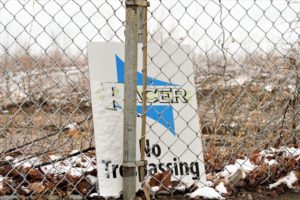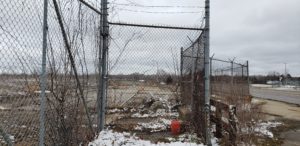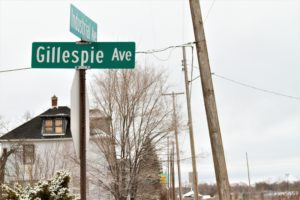By Tom Travis
New legislation introduced in the U.S. House of Representatives this week aims to help bring new economic development opportunities to Flint’s Buick City and generate economic revitalization in Flint, according to a Monday press release from U.S. Representative Dan Kildee’s office.
The legislation would make Buick City an Opportunity Zone to generate economic development and investment. The legislation was co-sponsored by Kildee (D-MI-05) and Rep. Dutch Ruppersberger (D-MD-02).

Racer Trust signs are scattered around the perimeter of the 413-acre industrial brownfield formerly Buick City. (Photo by Tom Travis)
The new legislation, called the Rust to Revitalization Act, would allow Buick City and other former industrial and brownfields sites across the country to qualify as Opportunity Zones, stimulating investment and environmental renewal.The Opportunity Zones program was created in 2017 to help stimulate investment in older, industrial cities and towns like Flint, Saginaw and Bay City, by giving investors preferential tax treatment on investments in areas that qualify, the press release explains.
However, some of the most in-need sites, such as Buick City, were not eligible to be designated as Opportunity Zones. The new legislation would fix this oversight by designating census tracts where there is zero population as Opportunity Zones if they are former industrial, brownfields sites and are adjacent to an already designated Opportunity Zone.

The former Buick City site in the northeastern part of Flint, MI. (Photo by Tom Travis)
The U.S. Treasury Department and the Internal Revenue Service announced Opportunity Zones for development across the country in 2017; they offer a tax deferment of 10 years for investors. More information and a map of all Opportunity Zones in Flint can be found at The City Flint’s website.
“The Opportunity Zones program was supposed to incentivize economic investment in older, industrial areas. But this program overlooked places like Buick City, in my hometown of Flint, that need this additional help to attract investment. This bill will fix this, ensuring Flint has all the economic development tools it needs to revitalize Buick City and thrive,” Kildee said.
Buick City is a former automotive manufacturing site in Flint that the General Motors Corporation used throughout the late 20th century to manufacture transmission and engine components until it ceased operations in 2010.
The Buick City site is a 413-acre industrial brownfield which once boasted 30,000 employees in 24 buildings — making it one of the largest manufacturing facilities in the world. In its last years before it shut down entirely in 2010, it was the primary producer of the Pontiac Bonneville and Buick LeSabre.
The Revitalizing Auto Communities Environmental Response (RACER) Trust currently owns Buick City and is working to complete the necessary environmental cleanup work for the entire 413-acre site. Buick City was not initially eligible for designation as an Opportunity Zone because it has no permanent residents, meaning it didn’t meet the definition of a “low-income community” necessary to qualify.
“This is an opportunity to correct an oversight regarding an important investment tool to redevelop Buick City. Expanding eligibility in the Opportunity Zone legislation will make Buick City more competitive by providing tax savings for those who want to invest at this amazing site.
Site of the former Buick City. (Photo by Tom Travis)
“Moreover, returning the site to productive use is a top economic development priority that will benefit all of Genesee County. We thank Congressman Kildee for introducing this important legislation to help develop Buick City,” stated Tyler Rossmaessler, Executive Director of the Flint and Genesee Economic Alliance.
Mona Munroe-Younis, Executive Director of the Environmental Transformation Movement, expressed thanks for introducing legislation to correct this oversight in the Opportunity Zones program so that brownfields like Buick City can benefit from economic development incentives.
“Flint has a real opportunity to turn Buick City into a place that serves environmental justice—putting Flint on the map for something needed now and in the future, like manufacturing solar panels or electric vehicles, while minimizing environmental impacts on surrounding neighborhoods,” Munroe-Younis said. “I am excited that the Opportunity Zone designation could open the doors for greater environmental clean-up and environmentally responsible reuses of the Buick City site!”

The neighborhood surrounding the former Buick City. (Photo by Tom Travis)
Scott Shewcraft, vice president of policy at the Economic Innovation Group (EIG) said, “Many low-income communities are home to industrial brownfield sites that have become visible signs of decay within their communities. This legislation would expand the reach of the Opportunity Zones incentive so that those areas can be transformed to once again serve as anchors of economic activity. EIG welcomes this and other bipartisan efforts to build upon and enhance the original Opportunity Zones legislation in ways that improve economic well-being for overlooked communities nationwide.”
EVM Managing Editor Tom Travis can be reached at tomntravis@gmail.com.



You must be logged in to post a comment.